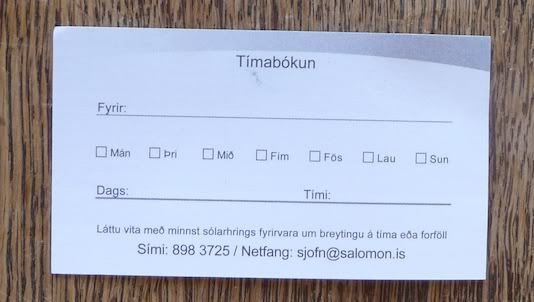Days of the Week Posted by sequoia on Jun 16, 2012 in Icelandic grammar
Here are the days of the week. Names of the months and how to write dates will come in a later post.
sunnudagur – Sunday (sun-day)
mánudagur – Monday (moon-day)
þriðjudagur – Tuesday (third-day)
miðvikudagur – Wednesday (mid-week day)
fimmtudagur (sometimes spelled as “fimtu”, especially in older texts) – Thursday (fifth-day)
föstudagur – Friday (fasting-day)
laugardagur – Saturday (bathing-day)
Days of the week aren’t capitalized unless they’re at the beginning of a sentence. You can see that they all end in “-dagur”. This makes things easy, as all the words thus decline (change) in the same way when making sentences.
Í dag – today
Í dag er mánudagur – Today is Monday. You use the “dagur” form when að vera (“er”) is in front of the day of the week. This is because that verb “governs” nominative (dictionary) case, which just means that it forces the words it’s talking about to be in nominative.
að ætla – to plan, intend, “going (to)” such as in “I’m going to go to the store” and “I’m going to do it”
að læra – to learn, study
Ég ætla að læra íslensku á mánudaginn – I plan/am going to learn/study Icelandic on Monday. The “daginn” ending means that you’re only talking about one specific day or time. This is in accusative case, but don’t worry about cases if you’re not learning them yet.
Note: You cannot have two conjugated verbs right next to each other. Saying “ég ætla læri íslensku” is like “I intend learn icelandic”. You have to put “að – to” in-between and change the second verb to be in infinitive form (in English we can keep the second verb the same and only need to add in “to”, but Icelandic needs the extra step). There are some other rules with this but I won’t go into them here.
Ég læri íslensku á mánudögum – I study Icelandic on Mondays. The “dögum” ending means multiple days, in this case multiple Mondays. This is in dative plural.
Á hverjum (…)degi – Every (…)day. This can be left alone or you can add a real day into it.
Ég læri íslensku á hverjum mánudegi – I study Icelandic every Monday. This is in dative singular.
There are different ways to abbreviate the days of the week depending on how much room you have to write with:
S., Sun., Sunnud.
M., Mán., Mánud.
Þ., Þri., Þriðjud.
M., Mið., Miðvikud.
F., Fim., Fim(m)tud.
F., Fös., Föstud.
L., Lau., Laugard.

This is the backside of a business card. It has a convenient form you can fill out to remember your next appointment.
Finally, here are some more phrases you can play around with depending on your level of Icelandic. Remember to look things up in the dictionary and declension dictionary to make sure you are putting them in the right case:
gærdagur, Í gær – yesterday
í gærkvöld – yesterday evening
í gærmorgunn – yesterday morning
Í fyrradag – the day before yesterday
í fyrrakvöld – the evening of the day before yesterday
um daginn – a few days ago
hinn daginn – the other day
á daginn – during the day, in the daytime
allan daginn – all day long
í morgun – this morning
á morgun – tomorrow
til morguns – until tomorrow/morning
í hverri víku – every week (hverri is the same word as hverjum, it’s just declined differently)
um helgina – over the weekend
eftir helgina – after the weekend (“at the beginning of next week”)

Build vocabulary, practice pronunciation, and more with Transparent Language Online. Available anytime, anywhere, on any device.
About the Author: sequoia
I try to write about two-thirds of the blog topics on cultural aspects and one-third on the language, because there's much more out there already on the language compared to daily life information. I try to stay away from touristy things because there's more of that out there than anything else on Iceland, and I feel like talking about that stuff gives you the wrong impression of Iceland.




Comments:
Verónika:
This is useful information, thanks for this blog entry. I think I can now correctly know when to use dagur, daginn, and dögum. Finally!
sequoia:
@Verónika Thanks! I’m always nervous about what I’m posting here, I usually don’t know if anyone would find it useful.
I find it easier to memorize set phrases instead of trying to work on memorizing the conjugations of every single verb and noun and then trying to piece them together haphazardly. Unfortunately you have to tackle all that stuff sometime though… I used to use Byki to memorize sentences a lot but back then I didn’t study the grammar much so I was left with lots of questions all the time.